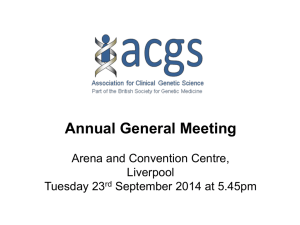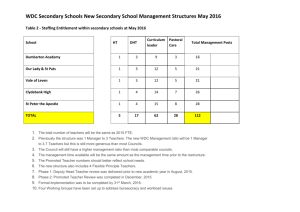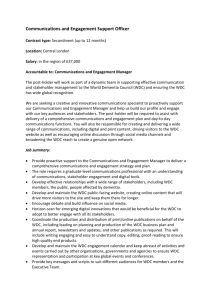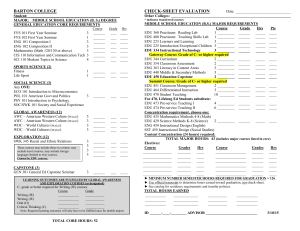Workforce Development Committee Meeting 18 June 2013
advertisement
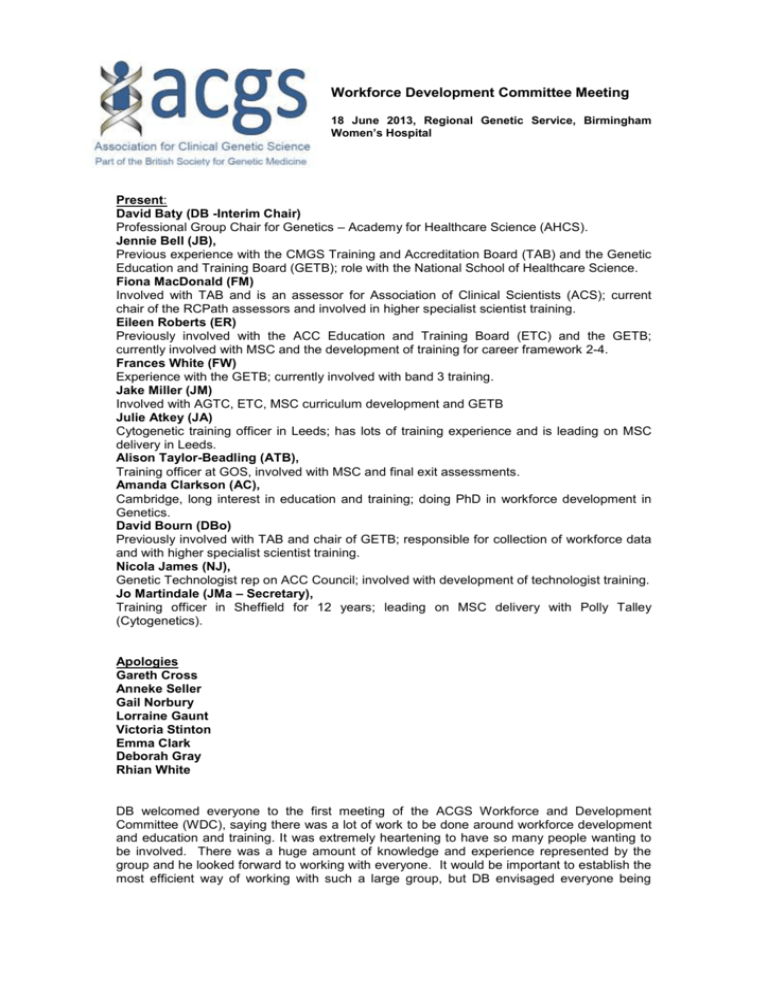
Workforce Development Committee Meeting 18 June 2013, Regional Genetic Service, Birmingham Women’s Hospital Present: David Baty (DB -Interim Chair) Professional Group Chair for Genetics – Academy for Healthcare Science (AHCS). Jennie Bell (JB), Previous experience with the CMGS Training and Accreditation Board (TAB) and the Genetic Education and Training Board (GETB); role with the National School of Healthcare Science. Fiona MacDonald (FM) Involved with TAB and is an assessor for Association of Clinical Scientists (ACS); current chair of the RCPath assessors and involved in higher specialist scientist training. Eileen Roberts (ER) Previously involved with the ACC Education and Training Board (ETC) and the GETB; currently involved with MSC and the development of training for career framework 2-4. Frances White (FW) Experience with the GETB; currently involved with band 3 training. Jake Miller (JM) Involved with AGTC, ETC, MSC curriculum development and GETB Julie Atkey (JA) Cytogenetic training officer in Leeds; has lots of training experience and is leading on MSC delivery in Leeds. Alison Taylor-Beadling (ATB), Training officer at GOS, involved with MSC and final exit assessments. Amanda Clarkson (AC), Cambridge, long interest in education and training; doing PhD in workforce development in Genetics. David Bourn (DBo) Previously involved with TAB and chair of GETB; responsible for collection of workforce data and with higher specialist scientist training. Nicola James (NJ), Genetic Technologist rep on ACC Council; involved with development of technologist training. Jo Martindale (JMa – Secretary), Training officer in Sheffield for 12 years; leading on MSC delivery with Polly Talley (Cytogenetics). Apologies Gareth Cross Anneke Seller Gail Norbury Lorraine Gaunt Victoria Stinton Emma Clark Deborah Gray Rhian White DB welcomed everyone to the first meeting of the ACGS Workforce and Development Committee (WDC), saying there was a lot of work to be done around workforce development and education and training. It was extremely heartening to have so many people wanting to be involved. There was a huge amount of knowledge and experience represented by the group and he looked forward to working with everyone. It would be important to establish the most efficient way of working with such a large group, but DB envisaged everyone being involved with the work of the WDC and perhaps developing small working groups to take forward specific topics. It would be desirable to draft a workplan for the next 12 months. Several members of the WDC were also involved with other bodies. DB stated that if any apparent conflicts of interest arose during discussions; people should declare them. The ACGS will formally come into existence once final endorsement has been received from the Charities Commission. An ACGS Executive Committee meeting is scheduled for the 25th June in Edinburgh. National training and development landscape in Healthcare Science It is anticipated that this group will be the primary focus for training and workforce development for the ACGS and its members. DB stressed that the WDC would build on the excellent work undertaken previously by the GETB, including the development of training programmes for career framework for bands 2-4, statutory registration for Genetic Technologists and collaborative working with key groups involved in training, education and workforce development. These groups include: The Academy for Healthcare Science (AHCS) which is principally involved in assessing equivalence, establishing registers for those healthcare staff not currently registered and developing career stage 2-4 programmes. The Association of Clinical Scientists (ACS); currently working closely with AHCS on routes to registration. The National School for Healthcare Science (NSHCS) plays a key role in developing and monitoring progress of the various MSC curricula. Royal College of Pathologists (RCPath); primarily with FRCPath and HSST. It is important for the ACGS that the WDC and its members are up to speed with the work of the key stakeholders and how we can work collaboratively with them. The WDC will be the focus for all enquiries to the ACGS about workforce development and training issues and we must ensure that we effectively represent the needs of the ACGS members. Structure and working of committee DB wanted to ensure that the new WDC had appropriate representation from the various staff group working in Genetics. The group felt that either a representative or advisor with experience in bionformatics would be helpful might be useful. JM and JB to approach suitable individuals.. The committee discussed a representative from career grades 2-4. All agreed that we should perhaps develop / bed in the WDC first. A lot of band 4 staff are “overqualified” so may not be truly representative. Look at what other HCS professions are doing with regard to grade 2-4 representation. All felt that a trainee rep would be valuable There are RCPath and STP trainee reps on various committees and DB agreed to ask Nicola Williams to put out a call for a trainee rep to sit on WDC. Terms of reference and remit for the WDC A draft ToR drawn up by DB was circulated to everyone prior to the meeting. DB went through the ToR in detail and made changes to the document as agreed by everyone present. He agreed to circulate the revised ToR to WDC once he had made the agreed amendments. DB hoped to have the amended ToR available to ratify at the ACGS Exec meeting on the 25 th June. It is important that the ToR of the WDC is in the same format as those from the other committees being led by Sandi Deans (Quality), Dom McMullan (Scientific) and Simon McCullough (Communications). There should be active engagement with any interested parties and formalisation of an agenda with circulation to membership. The meeting went on to discuss the remit of the group and the roles and responsibilities of WDC members – small working groups in line with other committees, need to agree a high level work plan and define priorities for the WDC. Some amendments/additions were made to the remit of the group. Accountability of the WDC Covered in ToR; agreed that the WDC through the Chair or Chair Elect shall represent views of the membership and be accountable to the ACGS Exec. Continuing the work of the GETB DB expressed his thanks to all members of the GETB and in particular to Jenny Bell, David bourn and Gordon Lowther. He stated that the achievement of the GETB could not be overstated. It was the first joint committee in Genetics dedicated to training and was responsible for breaking down the cyto/molecular barriers. It is very heartening that so many former GETB members want to continue with the WDC. DB felt it important that the work strands of the GETB be picked up by this committee, including: NSHCS themed boards – suggested as a standing agenda item on WDC agendas. The 2-4 career framework, which is an important area of work as the service develops. Support development of OSFAs – this group is to work with the NSHCS and the AHCS and the themed boards to assist with the OSFA process. WDC involvement in the OSFA process is very important. This year’s OSFA date is 8th August. It would be helpful to develop further assessors and appropriate training is important. All agreed to discuss the OSFA process and how the WDC can help at the next committee meeting. The Royal College of Pathologists is currently considering a maximum interval of 7 years between FRCPath parts 1 and 2. Exceeding this maximum, would mean that the candidate would need to sit the part 1 exam again. This proposal is being considered by RCPath Council. The part 1 examinations for Cytogenetics and Molecular Genetics will merge in 2015, although there will be some choice. Complete merger for part 1 is aspired to by 2018 but part 2 will take longer. Some of the ACGS membership is undecided as to whether it is better to wait for the joint examination or sit it while exams exist in cyto and molecular. The Clinical Bioinformatics STP curriculum is to be approved by this committee. There will be a focus on year 1, with a curriculum review in January 2014. The WD committee needs to take a high-level view and consider whether the proposed modules will deliver the desired outcomes. It was agreed that approval could be given in principle but that the committee must take an overview and obtain feedback from labs delivering training. Any changes are to be highlighted. Richard Billings and Gillian Manning are leading on the Bioinformatics curriculum development. DBo is currently collecting workforce data from the labs for 2012/13. Workforce data is required to inform planning but it can be difficult to get age details and likely retrials. which cannot be used to inform likely retirements. DBo will send out a reminder to all labs stressing the importance of sending in this data. Support for commissioning of training posts; in the past data has been shared with the Centre for Workforce Intelligence and the RCPath. Registration for GTs The mechanism to achieve appropriate registration status for Genetic Technologists has been a long-standing issue. DB thanked Michelle Fenlon and others involved with the Voluntary Registration Council (VRC) and the Association for Genetic Technologists (AGTC) for their hard work over the years. He stated that GT registration should be a key priority for the new WDC. JM welcomed this and asked how we could take this forward. The AHCS in collaboration with the VRC and other voluntary registers is working to establish a register of staff in Healthcare science who are not currently registered with the Health and Care Profession Council (HCPC). This umbrella voluntary register will be accredited by the Professional Standards Authority. The AHCS is proposing voluntary registers for technical staff, not registered as a Biomedical Scientist but will in future look to develop registers for career grade 2-4 staff as well as those exiting HSST. Currently a number of undergraduate degrees in healthcare science have been accredited such that those exiting as Practitioners will be eligible to apply to HCPC as Biomedical Scientists. This is obviously of concern considering qualifications, knowledge, skills and experience of our GTs who cannot achieve registration with HCPC. DB therefore suggested that a formal approach be made to IBMS to explore the feasibility of establishing a working party to look at mapping standards of Biomedical Scientists and Genetic Technologists. All those present at the meeting agreed to this approach. DB would raise this at ACGS Exec meeting to obtain approval to proceed. There is a question around the role of the AGTC now that the CMGS and ACC will be replaced by ACGS. It still has a role around gatekeeping of the VRC, and could take on the assessment role for applications to the VRC? Any AGTC workstreams that have not already been picked up by another group should be taken on by the WDC. The good work of the AGTC is recognised and we must ensure adequate representation on the WD committee. DB agreed to contact Michelle Fenlon and BJ Borghams to discuss role for AGTC. Career framework 2-4 training All agreed that this would be an important workstream for the WDC. Shirley Fletcher has looked at NOS and what is already out there in terms of training modules for this group of staff. She has approached HEIs and City and Guilds amongst others. This framework is quite well developed for levels 2 and 3, less so for 4. Level 2 – Assistant Practitioner Level 3 – Associate Practitioner Level 4 – modules expected to contribute to a foundation degree. These would include personal e.g attributes etc., themed (Pathology) modules, functional modules. A decision needs to be made as to whether the framework was fit for purpose in developing school leavers. It is, but not so appropriate for existing staff. There is an intent for equivalence but it is uncertain when this will be. The AHCS hope to establish a voluntary register for this group of staff. It seems that the framework is becoming overlapped with apprenticeship (which does not currently exist) and it is unclear what the equivalence mechanism is. All new NVQs are accredited within the Qualifications and Credit Framework (QCF). Shirley’s framework has been done from the perspective of setting up a course and is not necessarily appropriate for pre-existing staff. There may be some value in looking at current 2-4 staff and their qualifications. These posts are aspirational, but it takes a lot of effort to develop school-leavers. Guided learning hours need to be factored in. This is a remit for a subgroup of this committee with technologist involvement. Concerns, including the impact on Genetics, need to be highlighted. ER to lead on this and JA would like to be involved – there is the possibility of 8 apprentices in Leeds this autumn. It is likely that their Genetics background will be limited or at an inappropriate level; there is a significant level of skill required for many tasks at CF 2-4. Deborah Gray may wish to be involved but is currently on maternity leave. Competence-based training would be ideal. This committee needs to highlight the requirement for something fit for purpose. Workplan The following priorities for the WDC were agreed by the group: GT registration Career framework for levels 2-4 Higher specialist training for scientists and practitioners Should we reconsider the concept of a lead Training Officer for ACGS, to form a team of training officers? It would be more of a coordination role / point of contact. This ties in with CPD and developing pre-existing staff. Identify particular training needs and link with the committee to organise appropriate training. There used to be good training days and annual training officer meetings. JB is happy to organise another training officer meeting and maybe identify someone willing to take on a lead training officer role; also get useful feedback on e.g. what aspects of training don’t work. Anyone interested would need to be aware that the lead training officer would need their Head of Department’s support and this is difficult without knowing the full scope of the role. It is a good idea in principle but needs to be practicable – what is needed for the role, what would we consider important? The lead training officer would be a conduit for communication and coordination. Bioinformatics: some concerns regarding content and the curriculum has been updated. JB will circulate the latest version. CPD / cross training and RCPath Is this a role for this committee? e.g. part 1 study days. There has been a significant dip in the number of candidates this year. Birmingham is still happy to run the study days. Part 2 is more problematic as there is a very small pool of examiners. JB suggested sending out a request. Exit from HSST should lead to FRCPath. Cross training / rotation may be essential for GT registration purposes. There is a lot of confusion and clarity is required. This may be clearer when we know if the IBMS route is possible. Communication All agreed that effective communication was vital. This will be clearer once the remit of the ACGS Communications committee has been defined. There will be a dedicated WDC presence/link on the ACGS website. We need to get the ToR and minutes out as soon as possible, as well as information for the membership about the WDC committee members. Other areas of communication to explore are ways to show what careers in genetics are like to for example school students, involvement in National Pathology week and focussed study days etc. to be advertised on the website. Who do we communicate with, and at what level? AOB DB advised that travel expense claims should be sent to Kevin Ocraft (ACGS Treasurer Nottingham). All agreed that teleconference meetings were useful but felt that the next meeting of WDC should be in person. Birmingham appeared to be best venue for everyone to reduce travel. JB agreed to look at room availability and circulate dates. Summary of action points JM and JB to identify suitable individuals as Clinical Bioinformatics advisors to WDC. DB to contact Nicola Williams as ACGS Secretary to ask for trainee rep to sit on WDC. DB to amend ToR and circulate to group. DB to seek ratification of ToR from ACGS Exec. To to obtain agreement from ACGS Exec for approach to IBMS. DB to contact Michelle Fenlon regarding AGTC. ER to lead on career stage 2-4 training. JB to look at room availability in Birmingham for next WDC meeting.
